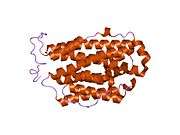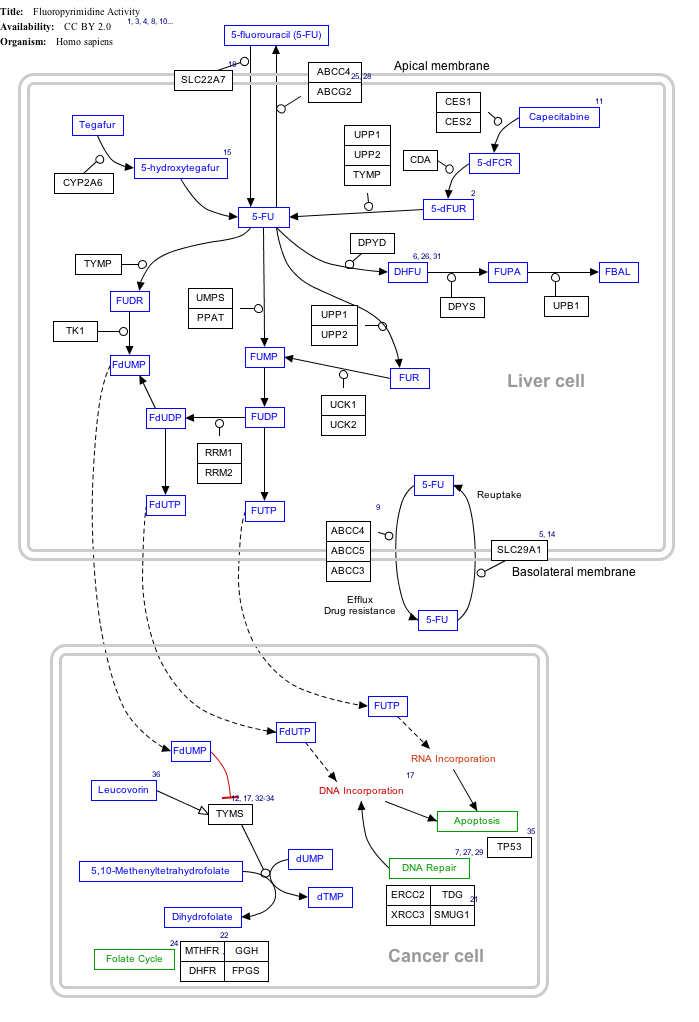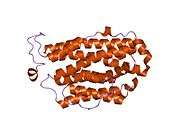RRM2
| View/Edit Human | View/Edit Mouse |
Ribonucleoside-diphosphate reductase subunit M2, also known as ribonucleotide reductase small subunit, is an enzyme that in humans is encoded by the RRM2 gene.[4][5]
Function
This gene encodes one of two non-identical subunits for ribonucleotide reductase. This reductase catalyzes the formation of deoxyribonucleotides from ribonucleotides. Synthesis of the encoded protein (M2) is regulated in a cell-cycle dependent fashion. Transcription from this gene can initiate from alternative promoters, which results in two isoforms that differ in the lengths of their N-termini.[4]
Interactive pathway map
Click on genes, proteins and metabolites below to link to respective articles. [§ 1]
Fluorouracil (5-FU) Activity edit
- ↑ The interactive pathway map can be edited at WikiPathways: "FluoropyrimidineActivity_WP1601".
References
- ↑ "Drugs that physically interact with Ribonucleoside-diphosphate reductase subunit M2 view/edit references on wikidata".
- ↑ "Human PubMed Reference:".
- ↑ "Mouse PubMed Reference:".
- 1 2 "Entrez Gene: ribonucleotide reductase M2".
- ↑ Pavloff N, Rivard D, Masson S, Shen SH, Mes-Masson AM (1992). "Sequence analysis of the large and small subunits of human ribonucleotide reductase". DNA Seq. 2 (4): 227–34. doi:10.3109/10425179209020807. PMID 1627826.
Further reading
- Lin ZP, Belcourt MF, Cory JG, Sartorelli AC (2004). "Stable suppression of the R2 subunit of ribonucleotide reductase by R2-targeted short interference RNA sensitizes p53(-/-) HCT-116 colon cancer cells to DNA-damaging agents and ribonucleotide reductase inhibitors.". J. Biol. Chem. 279 (26): 27030–8. doi:10.1074/jbc.M402056200. PMID 15096505.
- Zhang K, Hu S, Wu J, et al. (2009). "Overexpression of RRM2 decreases thrombspondin-1 and increases VEGF production in human cancer cells in vitro and in vivo: implication of RRM2 in angiogenesis". Mol. Cancer. 8: 11. doi:10.1186/1476-4598-8-11. PMC 2662784
 . PMID 19250552.
. PMID 19250552. - Cohen D, Adamovich Y, Reuven N, Shaul Y (2010). "Hepatitis B virus activates deoxynucleotide synthesis in nondividing hepatocytes by targeting the R2 gene". Hepatology. 51 (5): 1538–46. doi:10.1002/hep.23519. PMID 20155784.
- Ferrandina G, Mey V, Nannizzi S, et al. (2010). "Expression of nucleoside transporters, deoxycitidine kinase, ribonucleotide reductase regulatory subunits, and gemcitabine catabolic enzymes in primary ovarian cancer". Cancer Chemother. Pharmacol. 65 (4): 679–86. doi:10.1007/s00280-009-1073-y. PMID 19639316.
- Qiu W, Zhou B, Darwish D, et al. (2006). "Characterization of enzymatic properties of human ribonucleotide reductase holoenzyme reconstituted in vitro from hRRM1, hRRM2, and p53R2 subunits". Biochem. Biophys. Res. Commun. 340 (2): 428–34. doi:10.1016/j.bbrc.2005.12.019. PMID 16376858.
- Boukovinas I, Papadaki C, Mendez P, et al. (2008). Ramqvist T, ed. "Tumor BRCA1, RRM1 and RRM2 mRNA Expression Levels and Clinical Response to First-Line Gemcitabine plus Docetaxel in Non-Small-Cell Lung Cancer Patients". PLoS ONE. 3 (11): e3695. doi:10.1371/journal.pone.0003695. PMC 2579656
 . PMID 19002265.
. PMID 19002265. - Beausoleil SA, Villén J, Gerber SA, et al. (2006). "A probability-based approach for high-throughput protein phosphorylation analysis and site localization". Nat. Biotechnol. 24 (10): 1285–92. doi:10.1038/nbt1240. PMID 16964243.
- Kimura K, Wakamatsu A, Suzuki Y, et al. (2006). "Diversification of transcriptional modulation: Large-scale identification and characterization of putative alternative promoters of human genes". Genome Res. 16 (1): 55–65. doi:10.1101/gr.4039406. PMC 1356129
 . PMID 16344560.
. PMID 16344560. - Duxbury MS, Whang EE (2007). "RRM2 induces NF-kappaB-dependent MMP-9 activation and enhances cellular invasiveness". Biochem. Biophys. Res. Commun. 354 (1): 190–6. doi:10.1016/j.bbrc.2006.12.177. PMID 17222798.
- Attia S, Kolesar J, Mahoney MR, et al. (2008). "A phase 2 consortium (P2C) trial of 3-aminopyridine-2-carboxaldehyde thiosemicarbazone (3-AP) for advanced adenocarcinoma of the pancreas". Invest New Drugs. 26 (4): 369–79. doi:10.1007/s10637-008-9123-6. PMID 18278438.
- Couch FJ, Wang X, Bamlet WR, et al. (2010). "Association of Mitotic Regulation Pathway Polymorphisms with Pancreatic Cancer Risk and Outcome". Cancer Epidemiol. Biomarkers Prev. 19 (1): 251–7. doi:10.1158/1055-9965.EPI-09-0629. PMC 2805468
 . PMID 20056645.
. PMID 20056645. - Réjiba S, Bigand C, Parmentier C, Hajri A (2009). "Gemcitabine-Based Chemogene Therapy for Pancreatic Cancer Using Ad-dCK::UMK GDEPT and TS/RR siRNA Strategies". Neoplasia. 11 (7): 637–50. PMC 2697350
 . PMID 19568409.
. PMID 19568409. - Kolesar J, Huang W, Eickhoff J, et al. (2009). "Evaluation of mRNA by Q-RTPCR and Protein Expression by AQUA of the M2 Subunit of Ribonucleotide Reductase (RRM2) in Human Tumors". Cancer Chemother. Pharmacol. 64 (1): 79–86. doi:10.1007/s00280-008-0845-0. PMC 3043989
 . PMID 18941749.
. PMID 18941749. - Hillier LW, Graves TA, Fulton RS, et al. (2005). "Generation and annotation of the DNA sequences of human chromosomes 2 and 4". Nature. 434 (7034): 724–31. doi:10.1038/nature03466. PMID 15815621.
- Liu X, Xue L, Yen Y (2008). "Redox property of ribonucleotide reductase small subunit M2 and p53R2". Methods Mol. Biol. Methods In Molecular Biology. 477: 195–206. doi:10.1007/978-1-60327-517-0_15. ISBN 978-1-60327-218-6. PMID 19082948.
- Gerhard DS, Wagner L, Feingold EA, et al. (2004). "The Status, Quality, and Expansion of the NIH Full-Length cDNA Project: The Mammalian Gene Collection (MGC)". Genome Res. 14 (10B): 2121–7. doi:10.1101/gr.2596504. PMC 528928
 . PMID 15489334.
. PMID 15489334. - Bourdon A, Minai L, Serre V, et al. (2007). "Mutation of RRM2B, encoding p53-controlled ribonucleotide reductase (p53R2), causes severe mitochondrial DNA depletion". Nat. Genet. 39 (6): 776–80. doi:10.1038/ng2040. PMID 17486094.
- Souglakos J, Boukovinas I, Taron M, et al. (2008). "Ribonucleotide reductase subunits M1 and M2 mRNA expression levels and clinical outcome of lung adenocarcinoma patients treated with docetaxel/gemcitabine". Br. J. Cancer. 98 (10): 1710–5. doi:10.1038/sj.bjc.6604344. PMC 2391126
 . PMID 18414411.
. PMID 18414411. - Zhang YW, Jones TL, Martin SE, et al. (2009). "Implication of Checkpoint Kinase-dependent Up-regulation of Ribonucleotide Reductase R2 in DNA Damage Response". J. Biol. Chem. 284 (27): 18085–95. doi:10.1074/jbc.M109.003020. PMC 2709352
 . PMID 19416980.
. PMID 19416980.
This article incorporates text from the United States National Library of Medicine, which is in the public domain.






